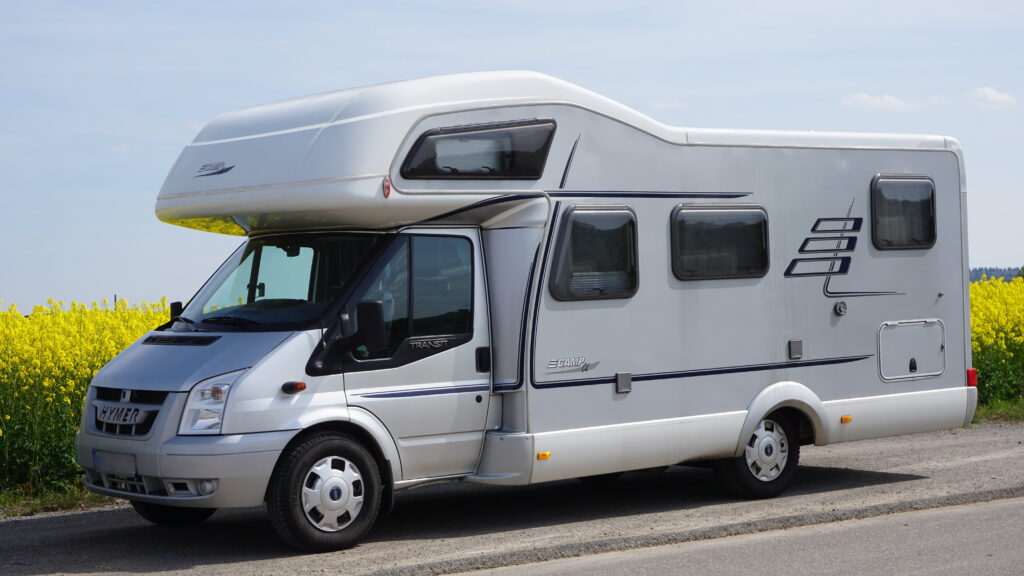What is RV Insurance?

1. What is RV Insurance?
RV insurance is designed to protect recreational vehicles (RV) from potential risks such as accidents, damage, theft, or vandalism. Just like car insurance, RV insurance is necessary to protect both the vehicle and the people inside it. However, RVs have unique coverage needs due to their size and use.
2. Types of RV Insurance Coverage
There are several types of coverage available, and depending on the level of coverage you choose, your premium and policy benefits may differ.
a) Liability Coverage
- Bodily Injury Liability: Covers medical expenses if you injure someone else in an accident.
- Property Damage Liability: Covers damage to another person’s property in the event of an accident.
- Legal Defense: Covers legal costs if you are sued as a result of the accident.
b) Collision Coverage
This covers damage to your RV if you’re in an accident with another vehicle or object, regardless of who’s at fault.
c) Comprehensive Coverage
Covers non-collision-related damage, like fire, theft, vandalism, or natural disasters (e.g., hail, floods, etc.).
d) Personal Injury Protection (PIP) or Medical Payments
This covers medical expenses for injuries to you or your passengers, regardless of who’s at fault in an accident.
e) Uninsured/Underinsured Motorist Coverage
Protects you if you’re in an accident with a driver who doesn’t have enough insurance or no insurance at all.
f) Emergency Roadside Assistance
This provides help if your RV breaks down while you’re on the road, covering things like towing, tire changes, fuel delivery, or jump-starts.
g) Full-Timers Insurance
If you live in your RV full-time, this coverage can act like homeowners insurance, covering personal property inside the RV and offering liability protection in case someone is injured while on your property.
h) Vacation Liability
Covers damages or injuries that occur while your RV is parked and not in motion, such as injuries in or around your RV during a camping trip.
3. Additional Coverage Options for RVs
- Custom Equipment Coverage: If you’ve made custom modifications to your RV (such as adding solar panels, awnings, or a custom kitchen), this coverage can protect those upgrades.
- Pet Injury Coverage: Some policies offer coverage for injuries to pets while traveling in your RV.
- Replacement Cost Coverage: In the event of a total loss, this will cover the full replacement cost of your RV, not just its depreciated value.
- Trip Interruption Insurance: Helps cover costs if your trip is cut short due to an accident, damage, or breakdown.
4. How Much Does RV Insurance Cost?
The cost of RV insurance varies greatly depending on:
- Type and Age of RV: A newer, more expensive RV will likely cost more to insure.
- Usage: Whether you use your RV full-time or part-time, and whether you travel long distances, will affect your premium.
- Coverage Limits: Higher coverage limits and lower deductibles will increase your premium.
- Your Driving Record: If you have a history of accidents or violations, your premium may be higher.
- Geographic Location: Insurance costs vary by state and even by ZIP code.
- RV Value and Condition: Newer RVs or those in better condition may cost more to insure.
- Optional Add-ons: Adding extra coverage or unique options (like full-timer or custom equipment coverage) can raise premiums.
On average, RV insurance can range anywhere from $300 to $1,000+ per year, depending on these factors.
5. Factors Affecting RV Insurance Rates
- Driving Record: Just like auto insurance, a clean driving record typically leads to lower premiums.
- RV Size and Weight: Larger, heavier RVs often require more expensive insurance due to increased risk and repair costs.
- Storage: If your RV is stored in a secured garage or covered storage, you may get a discount compared to keeping it parked on the street.
- Mileage: The fewer miles you drive each year, the cheaper your insurance might be.
6. State Requirements for RV Insurance
Unlike traditional cars, RV insurance requirements vary by state. Some states only require liability coverage, while others may have specific rules for RVs used for full-time living. It’s important to check your state’s minimum insurance requirements before purchasing a policy.
7. How to Choose the Right RV Insurance
When selecting RV insurance, consider these tips:
- Evaluate Your Needs: Think about how much you travel, whether you live in your RV, and the types of risks you want to cover.
- Compare Quotes: Get quotes from multiple insurance companies to ensure you’re getting the best deal.
- Consider Bundling: Some insurers offer discounts if you bundle your RV insurance with home or auto insurance.
- Read the Fine Print: Check for any exclusions, deductibles, and policy limits that could impact your coverage.
8. Common RV Insurance Myths
- “My regular car insurance will cover my RV”: Many car insurance policies do not cover RVs adequately. You’ll likely need specialized RV insurance.
- “Full-timers don’t need extra coverage”: Full-time RVers need specific coverage, such as personal property protection and liability that may not be included in standard RV policies.
Conclusion: Why RV Insurance is Essential
Whether you’re a weekend adventurer or a full-time RV traveler, insurance provides peace of mind. It protects you, your passengers, and your investment from unexpected circumstances while on the road. Choosing the right RV insurance ensures that you can focus on the adventure, knowing you’re covered for any situation.